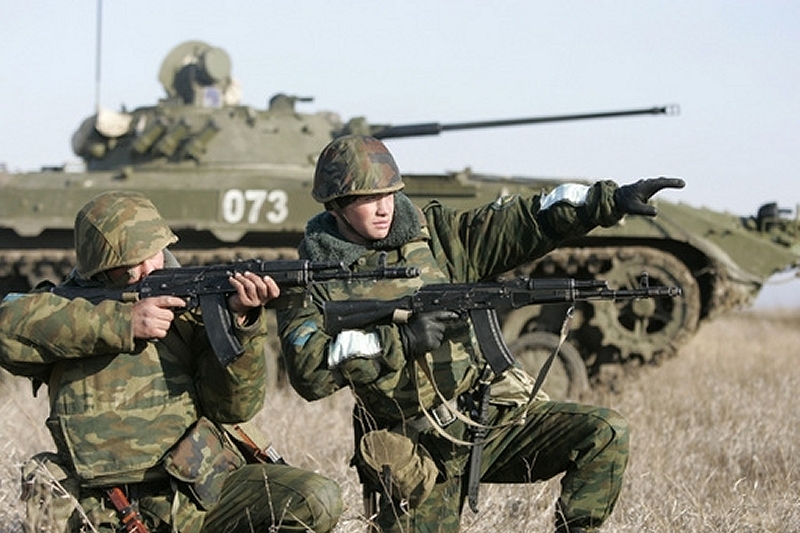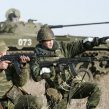
Medvedev’s Think-Tank Proposes Reinforcing Russia-Led CSTO (Part Two)
Publication: Eurasia Daily Monitor Volume: 8 Issue: 165
By:

Russian policy makers are in the process of defining conditions under which the Collective Security Treaty Organization (CSTO) might intervene to maintain political and civil order within member countries other than Russia (Belarus, Armenia, Kazakhstan, Kyrgyzstan, Tajikistan and Uzbekistan). In practice, any CSTO interventions could only be executed by Russia under a collective flag of convenience (“Medvedev’s Think-Tank Proposes Reinforcing Russia-Led CSTO,” EDM, September 8).
Russian President, Dmitry Medvedev, introduced this issue at the CSTO’s annual informal summit on August 12 in Astana. His proposals drew on a specially commissioned report from the Institute for Contemporary Development (INSOR), of which Medvedev is the board chairman. The proposals focus on using the CSTO to support and legitimize Russian-led stability operations in the organization’s claimed area of responsibility. Moscow proposes to establish criteria for invoking the Collective Security Treaty’s assistance provisions in response to internal upheaval within member states.
The Astana discussion was apparently confined to generalities, with CSTO “stabilization” assistance being considered in its political, intelligence, and military aspects. That summit, being informal, did not adopt decisions or documents. Belarusian President Alyaksandr Lukashenka, chairing the CSTO by rotation in 2011, embraced the idea of activating the CSTO, once a determination is made that foreign interference threatens the internal order of a member state. According to Kremlin sources, in an officially-inspired Izvestiya story, “the authorship of the initiative is Russian, even if Lukashenka voiced it publicly” (Interfax, Kommersant, August 12, 13; Izvestiya, September 7). INSOR’s pride of authorship was speaking there.
The CSTO’s Secretary-General, Nikolai Bordyuzha, has twice elaborated publicly on Moscow’s proposal. Visiting Minsk on August 30, he suggested that the CSTO should be activated when “national authorities [in member countries] are unable to protect the constitutional order, the lives and safety of citizens are threatened, violent mass disorders are under way. That is when the CSTO might intervene.” According to Bordyuzha, “December 2010 in Minsk [the opposition’s post-election protests] was an internal affair of the state of Belarus.” Undoubtedly in agreement on the latter point, Lukashenka suggested that the CSTO should consider responding to external attempts at “organizing a coup, which many are itching to do” (Interfax, August 30, September 7).
On September 3 in Dushanbe, a high-level CIS meeting (seven out of 12 CIS countries are CSTO members) occasioned further explanations from Bordyuzha to CSTO participants. In Moscow’s view, the CSTO must address not only potential military threats as heretofore, but also threats to the internal security and stability of member countries. The organization needs to “strengthen the legal basis and decision-making procedures for assisting legitimate state leaderships to protect the constitutional order.” Such assistance could be of a political, law-enforcement [i.e., intelligence], or military nature. According to Bordyuzha, externally inspired sources of instability can be found among local media, NGOs and “professional revolutionaries” influenced from outside. Among the CSTO countries’ presidents, Lukashenka and Uzbekistan’s Islam Karimov stayed away from the Dushanbe meeting (Interfax, September 4, 5; Kommersant, September 5; Bloomberg, September 6).
INSOR’s chairman, Igor Yurgens, elaborated further in a preview of the report, ahead of its scheduled presentation at the Yaroslavl world political forum in Medvedev’s and Bordyuzha’s presence. According to Yurgens, the situation in Belarus does not currently meet the proposed criteria for CSTO assistance to stabilize the situation. Yurgens singled out three of those criteria, with CSTO-wide applicability: “Whether the state can cope on its own with the situation, whether that situation was created by [interference of] external factors,” and “whether the head of state requests assistance.” This listing does not clarify the order of importance of these criteria (e.g., if hypothetical upheaval in a country could trigger a CSTO response in the absence of a request from the head of the state concerned).
When the circumstances meet those criteria, “CSTO forces could be called upon to intervene if the constitutional order is threatened.” A decision to activate the CSTO would be up to its council of heads of state. Yurgens’ report proposes a switch from consensus-based voting (requiring unanimity for a valid decision) to majority voting, in order to expedite decisions on this and other issues (Izvestiya, Interfax, September 7).
The Kremlin has promoted similar ideas in the CSTO in recent years, without success. The other six member countries have variously dragged their feet or stonewalled outright. At present, however, Moscow shows an unprecedented sense of urgency for turning the CSTO from a symbolic group into an operational instrument. INSOR’s report under Medvedev’s aegis is more fully developed, compared to similar initiatives during Vladimir Putin’s presidency. It is also being actively publicized beyond the CSTO’s framework, and (again unlike earlier initiatives) is being aired to test Western reactions, e.g. in the high-profile Yaroslavl forum.
Moscow’s new sense of urgency may be attributed to: lessons learned from Kyrgyzstan’s state collapse followed by inter-ethnic clashes in 2010, when the CSTO proved incapable of intervening; persistent fears of “color revolution” in several capitals – a factor that INSOR’s report mentions among its arguments for operationalizing the CSTO (see accompanying article); anticipation of instability spilling over from Afghanistan, as coalition troops withdraw from that country; and the NATO-flagged intervention in Libya, apparently inspiring Moscow to claim a parallel right of intervention in “its” domain. Above and beyond these factors, however, Moscow must perceive an unprecedented window of opportunity for its sphere-of-influence rebuilding during the West’s ongoing crises.




